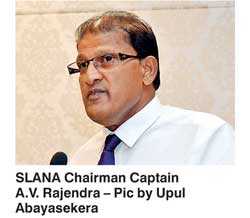Thursday Feb 26, 2026
Thursday Feb 26, 2026
Thursday, 28 June 2018 00:00 - - {{hitsCtrl.values.hits}}
By Madushka Balasuriya
The Sri Lanka Association of Non-Vessel Operating Common Carriers (NVOCC) Agents (SLANA) on Tuesday called on the Government to overturn a 2013 gazette notification, which mandates that all charges on containerised cargo be inserted into an ‘all-inclusive freight’.
SLANA claims the move, which came into effect in 2014, effectively prohibits NVOCCs from recovering shore-based costs such as Terminal Handling Charges (THCs).
“Due to some haphazard decisions taken by legislators and policymakers on shore-based cost recoveries, including the terminal handling charges, the businesses of service providers along with NVOs have been hampered,” said SLANA Chairman Captain A.V. Rajendra at the association’s Annual General Meeting.
“NVOCCs must be supported and encouraged with a level playing field, as is elsewhere in the region, to allow and permit to recover shore-based costs, which are currently being prevented by these so-called regulations.”
Captain Rajendra took the opportunity to also recall the occasion when an embargo had been placed on shipments to Iran and Iraq, and it was NVOCCs which had stepped up in terms of imports and exports.
“The maritime industries realised the importance of NVOCCs a few years ago only when shipping lines withdrew their services from certain ports in view of the economic sanctions imposed by the UN on those countries. Our exporters were left stranded, and NVOCCs stood by the exporters to export cargo to those countries.”
Rajendra opined that if regulations remained as they are, NVOCCs may have to re-evaluate their position in the country should such an incident arise again.
“SLANA is prepared to standby the Sri Lankan shippers and exporters by ignoring the shore-based costs, including the Terminal Handling Charges, for the benefit of the exporters and the country. But it will be only viable if the overall blanket prohibition of recovery on shore-based costs is lifted to sustain their businesses in Sri Lanka. Or otherwise the eagerness of NVOCCs doing business in Sri Lanka will always remain doubtful.”
However, industry experts argue the regulations at present, as per Gazette 1842/16 of 27 December 2013, require all charges to be incorporated into an ‘all-inclusive freight,’ a fee which will be borne by importers and exporters. The move essentially ensures that hidden fees cannot be tacked on to an agreed freight between carriers and exporters/importers.
An industry expert speaking to Daily FT stated the change was one which was a long time coming and had successfully negated the problem of hidden charges and anti-competitive practices.
“The gazette was brought in to stop anti-competitive practices from being adopted by service providers, which they forcefully imposed on importers, exporters and traders. At one time they were adding about 40 different charges on top of the freight,” said Shippers’ Academy Colombo CEO Rohan Masakorala, who is also a former Chairman of the Association of Shippers’ Councils of Bangladesh, India, Pakistan and Sri Lanka.
“This particular gazette doesn’t stop anybody charging anything. The fundamental principle is, if I contract with the carrier as an exporter, I pay everything – the carrier, whether it’s NVOCC or anybody, can include THC, any surcharge, anything – and the gazette says you have to quote that to the exporter on an all-inclusive rate. So no, they have not been prohibited at all by the gazette.”
The AGM also saw SLANA launch its new website www.slanalk.com.